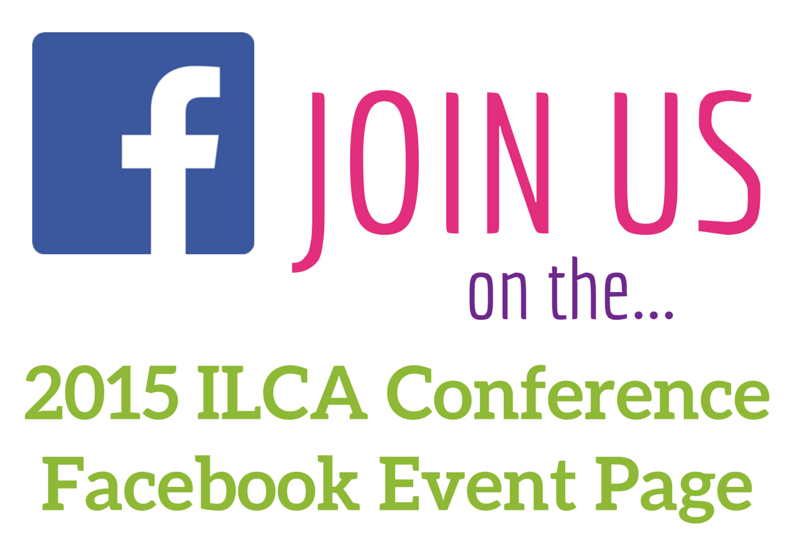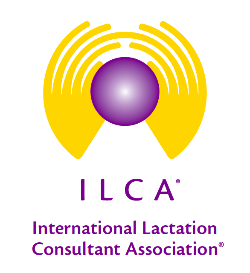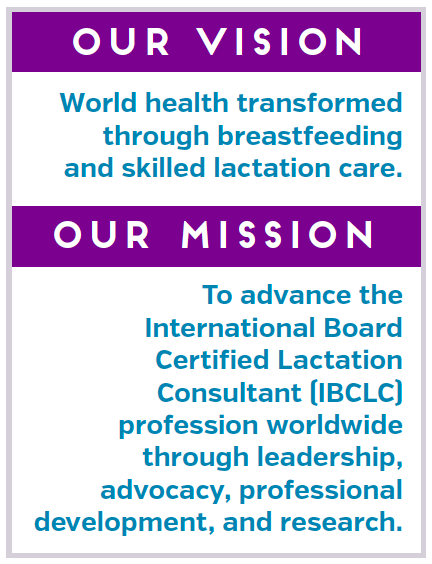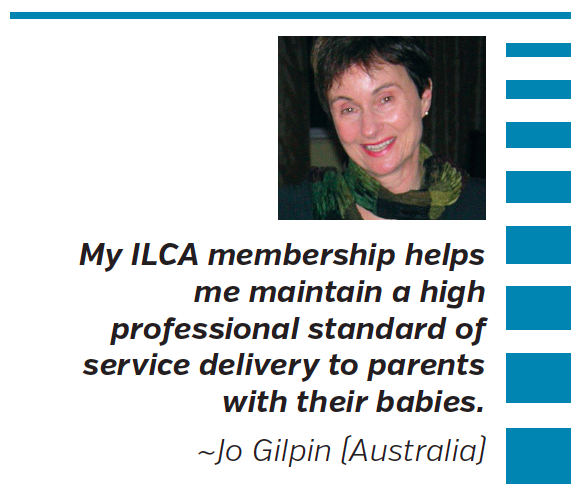
Workshop Sessions A (10:30am - 12:30pm) *choose one
Workshop W1A:
The Black Breastfeeding Paradox: When promotion falls short. (Kathi Barber, BS, CLEC; Mishawn Purnell-O’Neal, MPH) I-IIWorkshop W2A:
WHO Complementary Feeding Guidelines: Impact of adherence in breastfeeding up to 2 years. (Nora Alkharji, MD, IBCLC, DCH) I-IIWorkshop W3A:
Public Speaking and Presentation: Practicing skills to move from "good" to "best." (Phyllis Kombol, MSN, RNC-NIC, IBCLC) II-III R-CERPWorkshop W4A:
If I Knew Then What I Know Now: Advice for the new IBCLC in out-patient practice. (Jan Ellen Brown, BS, IBCLC, RLC) I-IIWorkshop W5A: Spanish Language Presentations
Disfunciones Orales y su Impacto en La Lactancia. (Lizabeth Gonzalez, MD, IBCLC, PhD) II-III
La Culpa es de La Vaca, Otra Vez. (Lizabeth Gonzalez, MD, IBCLC, PhD) I-II
Workshop W6A: Primary Clinical Skills Rotation I-II (Rotate through four 25-minute sessions)
Breast Massage Influenced by Japanese Style. (Rika Dombrowski, RN, MS, MA, IBCLC)
Teaching Tools for Basic Breastfeeding Skills. (Sherry Payne, MSN, RN, CNE, IBCLC, CD)
Three Important Rules for the Beginner IBCLC. (Barbara Wilson-Clay, BSEd, IBCLC, FILCA)
Case Study Review: Reducing the mother’s anxiety to accept help. (Mireya Patricia Roman, LMHC, IBCLC)
Workshop Sessions B (1:30pm - 3:30pm) *choose one
Workshop W1B:
Transmasculine Individuals' Experiences with Nursing Their Children: A qualitative study. (Joy Noel-Weiss, RN, IBCLC, PhD; Trevor MacDonald, BA (Hon)) IIExperiences of Lesbian Domestic Partners and Breastfeeding: Facilitating understanding to improve quality of care. (Kathleen F. McCue, DNP, FNP-BC, IBCLC) I-II
Workshop W2B:
Complementary and Alternative Medicine in Breastfeeding Consulting. (Nikki Lee, RN, MS, IBCLC, CIMI) I-IIWorkshop W3B:
Approaches to Clinical Instruction: Teaching skills and providing feedback. (Phyllis Kombol, MSN, RNC-NIC, IBCLC) II-IIIWorkshop W4B:
Insurance Coding, Documentation and Billing for IBCLCs: Looking at the big picture and understanding the game. (Donna Sinnott, BBA, IBCLC) IIWorkshop W5B: Spanish Language Presentations
Un Llamamiento a Todos Los Sentidos de Sus Alumnos: Herramientas creativas de enseñanza. (Mireya Patricia Roman, LMHC, IBCLC) I-II
Utilizando Resultados De Investigaciones En la Práctica. (Maryelena Vargas, RN, PhD, IBCLC) II-III
Workshop W6B: Advanced Clinical Skills Rotation II-III (SOLD OUT!)
Being the IBCLC Detective: Where do the clues take us? (Carole Dobrich, RN, IBCLC, RLC)
Powers of Deduction: Tongue kinematics in normal infant suck. (Catherine Watson Genna, BS, IBCLC)
Handling the Pain: Use of therapeutic breast massage for the treatment of engorgement, plugged ducts and mastitis. (Maya Bolman, RN, BA, BSN, IBCLC)
Choosing Supplementation Methods and Devices. (Tanefer L Camara, IBCLC, MS-HCA)
A1: Beauty and the Breast: The cultural context of breastfeeding. (Katherine Dettwyler, PhD) I-II
A2: Long-Term Oxytocin Mediated Effects on Behavior and Stress Levels Seen After Skin-to-Skin Contact After Birth. (Kerstin Uvnäs Moberg, MD, PhD) II-III
A3: The Baby-Friendly NICU Initiative: Collaborating internationally to develop designation in the United States. (Kathleen Marinelli MD, IBCLC, FABM; Patricia MacEnroe, BS, CDN, CLC) II-III
A4: Putting Patient First: Billing insurance companies for outpatient hospital lactation consultations.(Annette Leary, BSN, RN, IBCLC; Martha Lasley, BSN, RN, IBCLC) II
A5: African-American Women’s Perception of Breastfeeding Over the Years. (Natasha Sriraman, MD, MPH, FAAP, FABM) I-II
A6: Reviewing for Academic Journals with a Focus on JHL. (Anne Merewood, PhD, MPH, IBCLC) II R-CERP
A7: Breast and Nipple Pain in Breastfeeding Women: A simple tool to improve understanding and clinical management. (Lisa Amir, MBBS, MMed, PhD, IBCLC, FABM, FILCA) II-III
A8: Epigenetic and Long-Term Health: Embracing prenatal attachment and breastfeeding as a foundation. (Laurel Wilson, IBCLC, CLE, CCCE, CLD) II-III
A9: Communication and Collaboration with Physicians: Tips and troubleshooting to enhance interactions. (Andrea Ildiko Martony, MD, IBCLC; Margot Harris, RN, MSN, WHNP, IBCLC) II
A10: Unintended Consequences of Risk Messages for Milk Sharing: Insights from the field and implications for practice. (Aunchalee Palmquist, PhD, IBCLC) II
B1: Promoting Breastfeeding, Promoting Guilt? (Katherine Dettwyler, PhD) I-II
B2: Maternal and Infant Behavior and Physiology Caused by Medical Interventions During Birth. (Kerstin Uvnäs Moberg, MD, PhD) II-III
B3: Formula Marketing in the Information Age: A moving target. (Jennie Bever Babendure, PhD, IBCLC) I
B4: One-to-One or Never Done: Ethics issues when teaching about bottle and teat use. (Liz Brooks, JD, IBCLC, FILCA) I-III E-CERP
B5: Translating Breastfeeding Research into Practice: Improving breastfeeding rates among African American mothers. (LaVonne Moore, DNP, CNM, IBCLC) I-II
B6: “It’s Only a Little Formula:” Effects on breastfeeding duration and infant health. (Cynthia Howard MD, MPH) I-II
B7: Medications and Breastfeeding: Pharmacists as part of the mother's breastfeeding team. (Frank Nice, RPh, DPA, CPHP) II
B8: Lactation Assessment Tools: Reliability when applied to overweight and obese women. (Donna Chapman, PhD, RD) II
B9: Neuropsychological Effects of Sleep Training: Implications for breastfeeding. (Kathleen Kendall-Tackett, PhD, IBCLC, FAPA) I-II
B10: Community Support for Breastfeeding: A national public health perspective. (Gia Rutledge, MPH; Diane Roberts Ayers, MPH, RD, IBCLC) I-II
C1: Prevention, Availability and Sustainability: What Baby-friendly bedside care for low- and high-risk infants must offer. (Jane Morton, MD, FAAP, FABM) I-II
C2: The ABCs of Research: Appraising evidence to guide practice. (Azza Ahmed, DNSc, RN, IBCLC, CPNP; Sara Gill, PhD, RN, IBCLC, FAAN; Wilaiporn Rojjanasrirat, PhD, RNC, IBCLC) II-III R-CERP
C3: Making Your Professional Classes Memorable: Voices of experience. (Jan Barger, RN, MA, IBCLC, FILCA; Carole Peterson, MS, IBCLC; Linda Kutner, BSN, IBCLC, FILCA) III R-CERP
C4: Unlatched: When normal child development is mistaken as a breastfeeding problem. (Jan Tedder, BSN, FNP, IBCLC) III
C5: Anatomy and Physiology of Breast Pumps: Working with what we've got and innovations for the future. (Marsha Walker, RN, IBCLC) II
C6: Community Breastfeeding Support Groups for African American Women. (Tanefer L. Camara, IBCLC, MS-HCA; Brandi Gates, IBCLC) I-II
C7: Primary Clinical Skills Rotation I-II (Rotate through our 25-minute sessions)
Breast Massage Influenced by Japanese Style. (Rika Dombrowski, RN, MS, MA, IBCLC)
Teaching Tools for Basic Breastfeeding Skills. (Sherry Payne, MSN, RN, CNE, IBCLC, CD)
Three Important Rules for the Beginner IBCLC. (Barbara Wilson-Clay, BSEd, IBCLC, FILCA)
Friday, 24 JulyCase Study Review: Reducing the mother’s anxiety to accept help. (Mireya Patricia Roman, LMHC, IBCLC)
A1: Why Cuddles Matter: Early brain connections in babies and postnatal mothers. (Howard Chilton, MBBS, MRCP (UK), DCH) II-III
A2: Stem Cells and Immune Cells in Breastmilk. (Donna Geddes, PhD) II-III
A3: Of NICUs and Human Milk: 30 years of culture shift from high technology to human milk as standard of care. (Kathleen Marinelli MD, IBCLC, FABM) II
A4: Telling Stories: The importance of case studies in clinical care. (Barbara Wilson-Clay, BSEd, IBCLC, FILCA) II-III
A5: Global Trends in Breastfeeding: Policies, programs and initiatives that lead to improvements.(Chessa Lutter, PhD) I-II
A6: Food Sensitivities in the Breastfed Baby: Optimizing prevention and treatment through maternal diet. (Lindsey Hurd, MS, RD, IBCLC, LDN) II-III
A7: Breast and Nipple Pain in Breastfeeding Women: A simple tool to improve understanding and clinical management. (Lisa Amir, MBBS, MMed, PhD, IBCLC, FABM, FILCA) II-III
A8: Epigenetic and Long-Term Health: Embracing prenatal attachment and breastfeeding as a foundation. (Laurel Wilson, IBCLC, CLE, CCCE, CLD) II-III
A9: Communication and Collaboration with Physicians: Tips and troubleshooting to enhance interactions. (Andrea Ildiko Martony, MD, IBCLC; Margot Harris, RN, MSN, WHNP, IBCLC) II
A10: Unintended Consequences of Risk Messages for Milk Sharing: Insights rom the field and implications for practice. (Aunchalee Palmquist, PhD, IBCLC) II
B1: Colic: Myths, medicine, and making sense. (Howard Chilton, MBBS, MRCP(UK), DCH) I-II
B2: Factors Affecting Gastric Emptying in Term and Preterm Infants. (Donna Geddes, PhD) II-III
B3: When Tongue-tie/Lip-tie Get in the Way: Your pediatric laser dentist can help. (Rishita Jaju, DMD) I-II
B4: Professional Lactation Education: 30 years of evolution and leadership. (Maeve Howett, PhD, APRN, CPNP-PC, IBCLC) I-II
B5: Avoiding IBCLC Legal and Ethical Jeopardy: A game show. (Liz Brooks, JD, IBCLC, FILCA) I-III E-CERP
B6: Probiotic Bacteria in Human Milk and Inant Feces: Correlation with feeding mode, growth and gut health. (Amal El- Taweel, MD, IBCLC) II-III
B7: Medications and Breastfeeding: Pharmacists as part of the mother's breastfeeding team. (Frank Nice, RPh, DPA, CPHP) II
B8: Lactation Assessment Tools: Reliability when applied to overweight and obese women. (Donna Chapman, PhD, RD) II
B9: Neuropsychological Effects of Sleep Training: Implications for breastfeeding. (Kathleen Kendall-Tackett, PhD, IBCLC, FAPA) I-II
B10: Community Support or Breastfeeding: A national public health perspective. (Gia Rutledge, MPH; Diane Roberts Ayers, MPH, RD, IBCLC) I-II
C1: Evolution of Infant and Young Child Feeding: Implications for public health. (Daniel Sellen, PhD) I-II
C2: Oral Research Presentations II-III R-CERP
The Effect of Interactive Web-based Monitoring on Breastfeeding Outcomes: A randomized control trial. (Azza Ahmed, DNSc, RN, IBCLC, CPNP; Kinga Szucs, MD, FAAP, FABM, IBCLC)
Supporting Breastfeeding in Local Communities (SILC): Results of a cluster randomised controlled trial. (Lisa Amir, MBBS, MMed, PhD, IBCLC, FABM, FILCA)
A Model of Professional Barriers to Managing Breastfeeding Problems: Lactation consultants’ perspectives. (Erica Anstey, PhD, MA, CLC)
The Effects of Skin-to-Skin Contact on Newborn Temperature, Bath, and Breastfeeding. (Karen Gromada, MSN, RN, IBCLC, FILCA)
Bringing Baby-Friendly to the Indian Health Service. (Indian Health Service)
Exploration of Factors Related to the Prevalence of Sustained Breastfeeding in 37 6/7 Weeks Gestation Infants. (Joan Esper Kuhnly, DNP, NNP-BC, APRN, IBCLC, CNE)
Putting Patient First: Successully billing insurance companies for outpatient lactation consultations. (Annette Leary, BSN, RN , IBCLC; Martha Lasley, BSN, RN, IBCLC)
New Evidence on the Treatment of Nipple Pain. (Jo Watson, PhD, RN(EC), IBCLC)
C3: The Care and Feeding of Your Breastfeeding Practice’s Social Media. (Amber McCann, BA, IBCLC; Jeanette McCulloch, BA, IBCLC) II-III R-CERP
C4: Falling Through the Breastfeeding Promotion and Support Crack: Addressing the invisible middle. (Mishawn Purnell-O’Neal, MPH, MPH; Kathi Barber, BS, CLEC) I-III
C5: Creating a Breastfeeding Culture: One hospital's Baby-Friendly journey. (Jennifer South, RN, IBCLC, RLC) I-II
C6: Practical Tools to Support Lactating Women in the Workplace. (Jessica Shortall, MBA (honors)) I-II
C7: Advanced Clinical Skills Rotation II-III SOLD OUT!
Being the IBCLC Detective: Where do the clues take us? (Carole Dobrich, RN, IBCLC, RLC)
Powers of Deduction: Tongue kinematics in normal infant suck. (Catherine Watson Genna, BS, IBCLC)
Handling the Pain: Use of therapeutic breast massage for the treatment of engorgement, plugged ducts and mastitis. (Maya Bolman, RN, BA, BSN, IBCLC)
Choosing Supplementation Methods and Devices. (Tanefer L Camara, IBCLC, MS-HCA)







